Jewish community leaders in Antwerp are predicting that the coronavirus will infect 85% of its members — a significantly higher rate than the one projected for Belgium’s population.
The projection, which was compiled last week and obtained by the Jewish Telegraphic Agency, also predicts that the coming weeks will see at least 550 deaths in the heavily haredi Orthodox community based on a calculation of a 3.4% death rate among 25,000 people.
As of Friday, Belgium — which went into partial lockdown on Monday — had 1,795 confirmed cases and 21 deaths from the COVID-19 virus. The country’s top virologist said Tuesday that he expects half of Belgium’s population to contract the virus, while other estimates put the figure at 70%.
The estimate for Antwerp’s Jews is “higher than the general population due to social interactions,” according to the projection document compiled by medical experts in the community. A fifth of the community, or about 3,400 people, will require hospitalization and 10%, or 1,700 of the members, will reach a critical medical condition, according to the estimate.
The higher infection rate “makes sense, because Antwerp Jews all know each other, each synagogue is an extended family,” Michael Freilich, a Modern Orthodox lawmaker from Antwerp, told JTA.
“If the average Belgian person has a circles of 15 close friends and family,” he said, “then with Antwerp Jews it’s 150 people.”
Rabbi Pinchas Kornfeld, secretary-general of the Machsike Hadas religious community in Antwerp, told JTA that he was aware of several community members who went into self-isolation because they suspect they have the virus. There have been no deaths or severe cases from within the community, he said.
Rabbinical authorities from across Antwerp’s multiple haredi sections have instructed congregants to respect the lockdown order and refrain from gathering with people from outside their own household.
Many have, but some in the community are flouting the emergency regulations, according to Shmulie Markowitz, head of the Hatzole Antwerp Jewish community emergency and rescue unit.
In an impassioned WhatsApp plea to many community members, Markowitz urged Antwerp Jews to respect rules that block more than 10 people from occupying the same space at a store.
“People push in, and they bring their children with them, and this must stop,” he said in the message.
Freilich said the dire projections can be avoided. “Social distancing and partial quarantine are meant to ensure such numbers are never reached,” he said.
Kornfeld said members of his community are reluctant to tell others about diseases, adding to uncertainty about the virus.
“People don’t want to say ‘I have corona,’” he said. “It’s seen as a private matter, so there’s no way of knowing how far it’s spread so far.”
